![]()
The Words of the Cooper Family
|
|
The Words of the Cooper Family |
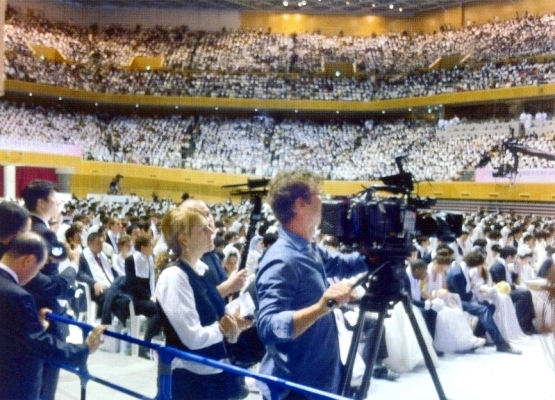
The
Firecracker Films crew filming for their documentary "Married to
the Moonies" at the March 24 Blessing Ceremony in the Cheongshim
Peace World Center.
In Britain, the Unification Movement so often finds itself in a paradoxical situation. On the one hand, it works with heads of state, politicians and prominent religious leaders; yet it has to operate against a backdrop of hysteria and bad argument put out primarily by small pressure groups of self-appointed, fanatical "cult-watchers" that actively campaign against new religious movements. To help clarify who we are and correct that situation, much of the work of the British movement's media outreach has been to encourage constructive communication with editors and journalists in order to update them on the way in which the movement has evolved and to help familiarize them with its current activities and developments. To that end, it aims to bridge the gap between the movement and the media, develop good working relationships, exploit any media opportunities and ensure impartial coverage of church-related matters.
Media workshops were held to help equip members with the skills required to deal with the media in a professional manner. Press packs were compiled and distributed to major newsrooms. As a natural follow-on from that, a series of face-to-face meetings began with journalists and broadcasters. Many of the meetings were with religious affairs correspondents. Others involved media executives, news reporters and television producers.
Little by little, some quite favorable news reports began to appear. A meeting and dinner with the managing editor of the Daily Mail represented a major turning point in the movement's turbulent thirty-year history with that particular publication' and the start of a far more healthy relationship. The Daily Mail's coverage of the Blessing Ceremony in Korea the following year was particularly good and it didn't even include the term "Moonie."
Negotiations led to the BBC World Service being able to interview Rev. Hyung Jin Moon in Korea, which resulted in an excellent piece on the radio and on the BBC web site. The popular tabloid newspaper the Sun ran a feature article about the process of matching and the Blessing Ceremony that included the input of couples from the Unification Movement in Britain. Meetings with television producers to explore the possibilities of programs about the Unification Movement were taking place at regular intervals and one was already at an advanced stage of research.
In November 2010, an interesting letter arrived from a television production company called Firecracker Films. Its development producer described the company as one that made sensitive and objective documentaries.
One of its recent productions was about the gypsy community, which the media has often demonized. It won an award as a show that was seen to have changed public perceptions. The production company thought the film went a long way to removing some of the suspicion and prejudices that people in the United Kingdom have about the gypsy community. The success of the documentary, they felt, was due to the fact that they'd made the film in collaboration with the community and that it was not just a film done about them.
They went on to say that they'd be interested in meeting us to discuss the potential for making a documentary about the Unification Church. They were aware that media portrayals done over the years had not been a fair reflection of the church's religious community and they welcomed an opportunity to discuss how we could work together to produce one that is. An initial meeting was set up for the following week at their London office.
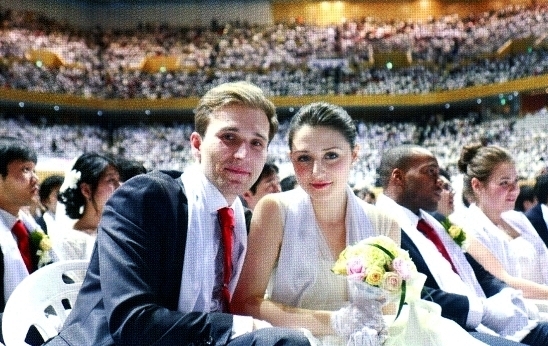
British
member E. B. and her Czech husband Andre Uhnak, one of three
second-generation couples who agreed to be followed by a documentary
film crew as they prepared for and participated in the Blessing
Ceremony in March.
For most of our media work in the United Kingdom, two is the ideal team. Any more than that and there's a danger of ending up with a committee that spins its wheels and accomplishes nothing. Ideally, the people that team up should have skills and thought processes that complement each other. In this instance, one of them was the national leader and the other a member who feels completely at home with the media, because of his professional background in television broadcasting. The combination works well and did so throughout the eighteen months that followed. Both understood that as far as the making of a television program about aspects of the movement was concerned, certain risks might be involved.
Firecracker Films is located in a modern building in a redeveloped part of Chelsea known as Imperial Wharf, near the River Thames. During the mandatory cup of tea in their conference room, we were introduced to the development producer and another staff member. The company's head of program then joined us and there was instant recognition between him and Simon Cooper, the church national leader. They had been at university together in Newcastle. It was an interesting coincidence and they reminisced for a while about how they used to play football together and about what their various friends were now doing.
We then got down to the business of discussing a potential television program about the movement. We had a good chat in which we outlined how the movement has evolved and its current activities. For their part, they assured us that they were interested in making a program that gave fresh insight into the Unification Movement as expressed by its members. Although Firecracker Films would have editorial control, as is the case for any production company, the program's merit would depend upon those who appeared in it.
We all went into the project with a spirit of trust and cooperation. Our agendas were of course not identical. They did not see their role as conveying God's message, and we are not in the business of providing factual entertainment for the masses on their television screens. However, we needed to hit upon an aspect of the Unification Movement that would make compelling viewing. Arguably, the Blessing Ceremony is one of the movement's most impressive spectacles, but it has occasionally featured on television before, so there would need to be a different approach. Various ideas were bounced around, and it was agreed that we would keep in touch and meet again soon to agree on the program's intended content.
E-mails went back and forth as did a fair amount of reference material. One new angle identified was the fact that in recent years much of the matching of second-generation members was being carried out by their parents. Could this interesting new twist be the central theme for a program?
At the next meeting with Firecracker Films, the idea was expanded on. Ideally they'd be interested in tracking three recently matched couples right through to their Blessing Ceremony. The overall style of the program would be to allow the individuals to tell their experiences on their own terms and in their own way. As some additional reassurance, the production company agreed to provide a written statement to the effect that it would not include input from critics or so-called experts. All the indications were that the production was likely to break new ground and that this would be an opportunity to portray the movement in a favorable light.
As a television producer and director, Richard is well aware that if one shoots sufficient footage on any given topic, one can string together selected extracts in a variety of different ways and then write the voice-over commentary with whatever slant one chooses. An element of risk is always involved when somebody else has editorial control. Nevertheless, we felt that the program's planned content far outweighed such fears and we could see that both Firecracker Films and our media team were working together toward the same thing.
So far, so good, but now we had to work out how we would be able to make things happen. We knew of some recently matched couples but how many of them would be willing to be tracked by a television camera crew over several months? Would those they were matched to also be willing to be featured in the program? Would their parents welcome such media intrusion and would they consider taking part? The best we could do was to draw up a list of potential families and start contacting them to find out.
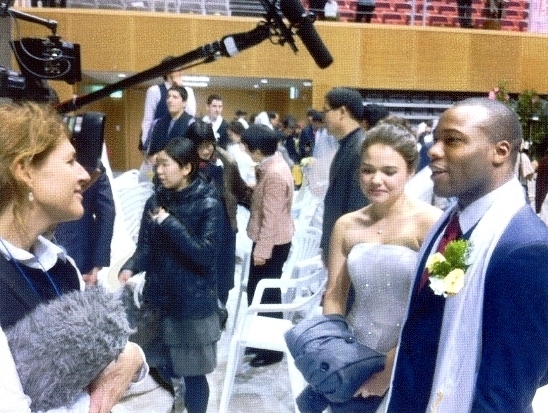
Sean
Greaves, a student from London and his bride Jessica from New York,
were also tracked for the documentary. Sean's mother Sharon spoke on
camera about matching her son.
Other practicalities were involved, such as granting access for a camera crew to the movement's premises. And what about the Blessing Ceremony itself in South Korea? How would they react to the presence of a foreign television production crew in their midst? We were aware that in recent years, such events had been covered by the international news media but this was an entire documentary program on the blessing process. We'd need to go through the right channels to ensure that the production would go ahead smoothly.
We also had to believe in ourselves and in our ability to deliver. It is one thing to tell a production company at initial planning meetings that we could probably get them access to this, that or the other -- but we knew in the backs of our minds that it might take a fair bit of convincing for the movement to be willing to cooperate. Based on unfortunate experiences of the past, some members remain highly suspicious of the media. Could they be persuaded that the times were changing and that this represented an opportunity?
Fortunately, in our own ways, we are both risk-takers -- not in a reckless way but after weighing up the pros and cons of a situation. Because of the nature of the program and that the couples' being able to tell their own stories in their own way had been negotiated, we felt we were on to a winner. We believed in the product ourselves and had to sell the idea to the movement in order to deliver appropriate program participants and access to the various locations.
Eventually the three second-generation couples willing to be the central contributors to the program were settled upon -- Sean Greaves, Reamonn Bateman and E. B. and those they had been matched to.
Because most of the UK filming was carried out in the London area, Simon was able to be on hand to oversee much of it. We were also in regular contact with the production team regarding progress and things such as dates, arrangements and availability and for any questions they had or any points that required clarification.
We had been in on the program's development from its initial conception and were developing a healthy working relationship with the production team. Some initial filming took place for Firecracker Films to make a short DVD "taster" of the program. They showed it to us in May 2011. It was good, fast moving, slick, informative and entertaining. The production company now had the task of pitching the program idea to various UK television stations to see which of them would be prepared to broadcast it. Within a matter of weeks, national broadcaster Channel 4 had commissioned it.
The program's storyline would essentially consist of tracking the couples through to their Blessing Ceremony, then scheduled for October, and the various situations that occur along the way. Yet the production company had no first-hand experience of the Blessing Ceremony and didn't quite know what to expect. Firecracker Films was starting from scratch and would need to progress along a steep learning curve. Fortunately, they brought in a Scottish female director, Barbie Maclaurin, who had an excellent record in documentary programs. She was able to grasp the essential storyline and put things into context, although even she didn't fully understand, at that stage, the enormity of the event that would take place in Korea.
Then the news came through that the Blessing Ceremony had been postponed several months and would most likely take place in March 2012. That threw off the production schedule.
Firecracker Films had already gathered a fair bit of filmed material with all three of the couples. They'd also filmed at the London headquarters and even at True Father's talk in London where they had interviewed Rev. Hyung Jin Moon. Every year in late summer, the Unification Movement in the United Kingdom holds a get-together and picnic for all members on the grounds of one of its premises in the Wiltshire countryside. The film crew was also invited to that.
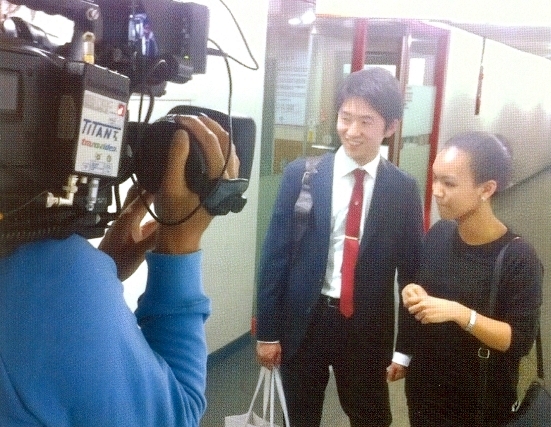
Kazuhiro
Fukushima and Naomi Davies, who'd been matched by True Parents a few
days earlier. Naomi said, "The Messiah matched me. That's been
my dream since -- forever."
Because of the postponed ceremony, the program's director took time out to work on an entirely different project for a couple of months. We were then back on course. Although the date for the ceremony hadn't been finalized, indications pointed toward March 2012.
A formal request had been made to Korean church's public relation's department. With regard to filming the Blessing Ceremony, we were advised to make the request for permission at a high level. European President Song made the request on our behalf and it was approved. That it would involve the presence of a small documentary crew used to filming observationally at live events was emphasized. They would have minimum equipment and at all times be as unobtrusive as possible. The production team was very aware of how important a day it is for all the couples and of the need to make sure they didn't disturb the proceedings in any way. A full outline of the project was provided and eventually it received a nod of approval. The production company's request for a written permit took a little longer but we got there in the end.
Another development was that the program had sparked interest in an American broadcaster called the Learning Channel. They wanted to know if Firecracker Films would be able to also make a modified version of the program that had more American subject matter for viewers in the United States. We liaised with our counterparts in New York on that and provided a detailed explanation, once again, of the entire production thus far. Fortunately, they were sufficiently intrigued by the idea and arrangements were soon underway for the British film crew to fly to America, where they gathered material at the Manhattan Center and did some filming with a recently matched American couple who would be attending the Blessing Ceremony in Korea.
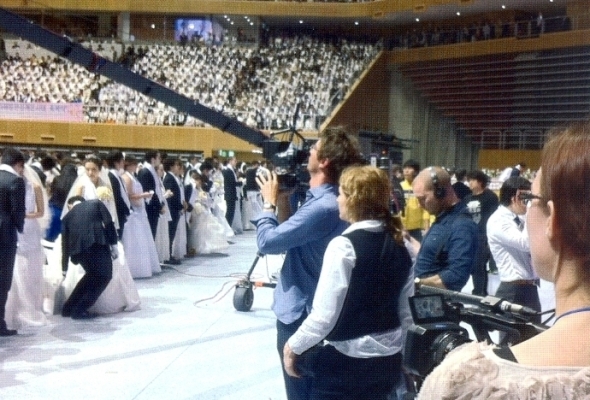
"Thousands
of couples... are about to be married by the ninety-two-year-old
Korean man they believe is the Messiah." The documentary was
straightforward and the Blessing Ceremony looked spectacular on film.
Saturday, March 24, was announced as the date for the Blessing Ceremony. As the participants were booking their flights for Korea, so too was the Firecracker Films production team, complete with its cameras. They planned to be there a few days beforehand to get a feel for the place. With some foresight, it was arranged that Simon would accompany them to Korea to act as their main point of contact.
On arrival, the Korean PR department was very helpful in enabling access to locations and coordinating the various production requirements. All went well for several days until 11 PM the night before the Blessing Ceremony, when the PR department informed Simon that unless he could provide written assurance that the word "Moonie" would not be used in the title of the program, they could not continue to grant access for filming at the stadium during the ceremony. It was the hardest moment of the entire production. It wasn't the best time to be having such a debate. It caused considerable panic among the production crew.
In Britain, although the term "Moonie" is derogatory, it doesn't carry anywhere near the same negative connotation as it does in some other countries. In fact, many British journalists and broadcasters are genuinely surprised when we inform them that the word is considered to be contemptuous. We discourage its use, but it's a slow educational process in which some section of the media (notably print media) have gradually opted to cease using it.
Although safeguards about the content of the program had been negotiated, a question mark had always been over the program's title. In fact, the choice of the program's title rested with the broadcaster, not the production company.
Frantic phone calls took place between Korea and the United Kingdom throughout the night. Finally, at 4 AM -- despite it not being possible for the production company to give any assurances regarding the title -- the Korean PR department granted the full access as had previously been agreed. Everyone breathed a huge sigh of relief.
Once the production company had returned to the United Kingdom, editing took place, after which the program was viewed by us for fact-checking purposes prior to its transmission. The UK broadcaster, Channel 4, is notoriously over-the-top in many of its commissions and its insistence of the title "Married to the Moonies" was clearly to attract attention and to pull in a larger number of viewers.
The program was well-received by members and nonmembers alike and the young couples who appeared in it certainly shone through. It is a compelling human-interest story. Although what works in one country doesn't necessarily work in another, the UK media team now enjoys considerable cooperation with America and South Korea in its media outreach. There's a common desire for the movement to develop a healthy relationship with the media rather than being caught up in an endless cycle of simply waiting to respond to the next instance of poor press coverage. There's also agreement that the desired relationship can best be achieved through endeavoring to keep the momentum up through an ongoing series of face-to-face meetings with producers, editors and journalists. The hope is that sooner or later this will lead to opportunities for the kind of media coverage that accurately portray aspects of the movement in a way that's also sufficiently intriguing to the audience.